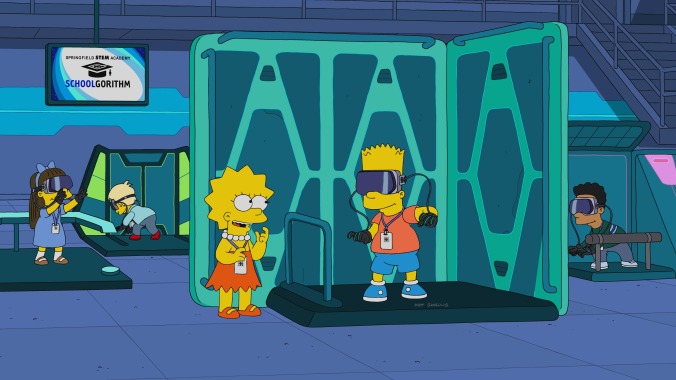And for a few brief moments, it looks like the Sea Captain (a.k.a. Horatio McCallister) is going to get his shot. In fact, he gets the honor anyway, as his prologue to this otherwise unmemorable episode is the only thing that’s going to have any staying power, in my mind at least. So much so that why don’t we spend an inordinate amount of time on it instead of the episode’s A-story (Springfield’s new STEM school proves inadequate). The cold open (no credits is usually a promising sign) sees a recreation of the drinking contest scene from Raiders Of The Lost Ark, compressed so that the dashing adventurer and his love interest and two-fisted co-adventurer thwart a Nazi’s attempt to steal their half of a prized treasure map thanks to some quick thinking and a niftily-directed action scene where the pair cross-spit flaming hooch into stormtroopers’ faces. Like Indy and Marion Ravenwood, the couple put aside their troubled past to make out and pledge to pursue the reunited map’s trail all the way to a far-off land called . . . Springfield!
Cut to the present day, where the grizzled Horatio (for ’twas he) plies his lonely journey through the waters off Springfield along with a bored but loyal crew, desultorily taking soundings of the resolutely un-fruitful sea bottom. Intermittent glimpses of his home life show that his marriage to that long-ago woman has turned exhaustedly bitter in his futile quest, with the young woman now a clinically depressed, resentful wreck. There’s a startling somberness to this whole sequence, as the wife’s (she’s never given a name) mental state is portrayed with a not-unsympathetic verisimilitude, and McCallister suggests adjusting her meds not as a callous joke, but in the manner of someone who’s helpless in the face of her depression. There’s a sickly thud to the development that a violent storm means McCallister’s got to tear up his meticulously marked off search grid and start all over, and when—after a miraculous “second ping!” sees the Captain and his crew haul up the heaping treasure chest of their dreams—his joyful exclamation, “I didn’t waste my life!” rings with just enough sincerity to make his inevitable fall all the more crushing.
Greeted at the docks by the ever-grifting Quimby and everyone’s cold-hearted lawyer, McCallister sees his life’s pursuit snatched from him via some quick remapping of the town’s unincorporated waters. Stunned, McCallister is then pummeled further by the revelation that his wife has finally given him over for the philandering Quimby, but even her betrayal is colored by the beleaguered woman’s lament to her man, “I should have been your treasure.” Damn. It’s like The Simpsons’ own mini-Up, an unexpectedly heart-wrenching preamble to the wacky main story everyone signed up for. Which is what makes it so cruel that McCallister’s happy realization that he’s no longer just “a flimsy, one-note character” is just the set-up for a shot of him passed out in the gutter outside of the town meeting where Quimby’s assembled the town to decide how best to squander their ill-gotten bounty. The Sea Captain doesn’t show up again.
Instead, there’s the STEM story, which would have had to be some stellar stuff to mask the bitter taste of the way it was set up. It isn’t.
There’s a trio of high-profile guests. John Legend and Chrissy Teigen show up to help sell Marge’s suggestion that Springfield build a STEM school. (Marge liked one of Teigen’s Instagram posts, which is all it takes for Teigen to get her EGOT husband to write a pro-STEM anthem and sing it live in Springfield.) And Silicon Valley’s Zach Woods tones down Jared’s clenched weirdness as the tech geek in charge of the quickly-constructed Springfield STEM Academy. (Springfield Elementary across the street is transformed into the town meeting’s second-place idea, a new Rock And Roll Hall Of Fame, only without Pearl Jam.)
There are a couple of good jokes. Finding that their new school is run via a secret algorithm, Martin helps explain the concept by comparing it to how someone who watches a lot of YouTube videos of close-up magic will suddenly start receiving ads for a suicide hotline. Homer, brought in for a career day, is freaked out at the idea of automation taking his job, immediately screaming about the rise of the robots and hoisting Ralph’s lanyard ID (and Ralph) up to the door-scanner to he can flee. (Plus, Homer’s exclamation of horror, “What the words?!” tracks Homer’s processing speed perfectly.) Bart, introduced to the school’s VR-based video game-esque learning tools excels at obtaining new skins for his avatar (“That’s how boys play dress-up!”), and thrills at winning the badge of Amazon warehouse worker jar-whizzing. The career day runner sees Woods’ chipper principal (sorry, “collaborative education outreacher”) rattling off just how soon each parent’s job will be obsolete. (Only the young mom who does social media for legal weed delivery is gonna be okay.)
And there are the seeds of a few good ideas sprinkled throughout the whole STEM milieu. That underachiever Bart is manipulated into preparing for a life of menial, gig economy side-hustles (charging e-scooters, shopping for rich people’s produce, driving ride-share) is slyly biting. And there’s a route of self-realization that overachiever Lisa is pointed down that hints at a truly satisfying examination of privilege and class when it comes to student tracking. Staging a Norma Rae-style revolt at how the “non-gifted” students are being trained to do everyone else’s dirty work, Lisa’s brought up short with a startled “Eep” by Woods’ administrator asking, “Isn’t that the point of a gifted class?” But for the most part, “The Miseducation Of Lisa Simpson” reads more like a checklist of writers room buzzwords (“STEM,” “gig economy,” “algorithm”) than an episode interested in using its subject to get inside its characters.
The denouement, with Lisa’s revolt causing the students to down-rate the school’s social media profile until it literally kills itself, carries on the queasy mental illness theme from the long-forgotten Sea Captain opener. Again, the joke that a zero star rating sees the self-aware school AI pronounce despondently, “Can’t get out of virtual bed . . . Self-destruct sequence initiated” isn’t played for laughs. Tress MacNeille’s makes the school’s suicidal depression comparable to that of the Sea Captain’s wife and, with no conveniently ill-advised way out like her human counterpart, the school successfully commits fiery suicide. “The Miseducation Of Lisa Simpson” is, from front-to-back, a bafflingly misfired clash of tones. There’s something real in Marge’s initial success, as her yelp to Homer, “I did it! I gave our kids hope for the future!” sets the stage for a complexity that never materializes. Similarly, Lisa, spying the busily typing “divergent pathway assimilators” in her gifted STEM class, exclaims that she’s finally going to be accepted for her brilliance, but her disillusionment abandons any character development in favor of a high-tech twist that has nothing to do with her. Somewhere, Captain McCallister presumably wakes up hungover and forgotten in the gutter.
Stray observations
- The episode looks great, at least. Gone are the days when Marge’s frugal, home-cooked meals were just unidentifiable green glop.
- There’s been a move to let odd little half-jokes breathe this season, which I like. After Legend is ordered by an irritated Teigen to charge their kids’ iPads, the pace slows down to watch him glumly do just that.
- Homer’s side-plot sees him rebelling against the plant’s new automated soda machine in a John Henry-styled pouring contest that I got literally nothing out of. At least Kevin Michael Richardson’s rootsy theme song acknowledges, finally, “Soda-pourin’s not a real thing.”
- Forget the lack of opening credits as far as leaving the episode time to tell a fuller story, as the end credits waste time with a Chalmers riverboat joke that’s as inessential as they come.










































